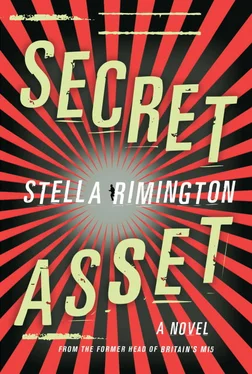The door to the other room opened and a sulky pigtailed girl of about twelve came out, carrying a violin case. She ignored Peggy, and headed straight for the front door, which she slammed behind her. Margarita came into the sitting room, turned to Peggy and raised her eyebrows. “I don’t know why some of them bother. If you hate the violin that much, it is not possible to play it well.” She had the faintest trace of accent. “I blame the parents. If you force a child, what does it do? It rebels.”
She was dressed simply but elegantly in a sleeveless black dress and a single-strand necklace of unadorned gold. Peggy noticed that she did not wear a wedding ring. “I’m going to make some tea,” she announced. “Would you like some?”
“I won’t, thank you very much,” said Peggy. “I don’t need to keep you very long.”
When Margarita moved into the kitchen next door, Peggy followed her as far as the doorway. The kitchen was tiny; opposite it Peggy could see a small bedroom, next to the room used for giving lessons. That seemed to be the extent of the flat, which went some way to explain to Peggy how a violin teacher could live in Kensington.
While the kettle boiled, Margarita took out a china cup and saucer. “How long have you been back in England?” asked Peggy.
“Back?” asked Margarita. She was filling the milk jug. “What do you mean?”
Peggy racked her brains. Had she made a mistake? She’d read Tom’s file for the umpteenth time before setting off that morning. No, she was certain of what it said. “We had you down as living in Israel. Not London. That’s why I’m here.”
“I haven’t lived in Israel for over ten years. Not since I married Tom. Are you sure you wouldn’t like a cup of tea?”
“Actually,” said Peggy, curious about the discrepancy between Tom’s file and the facts, “I’d love one.”
Margarita put tea things on a tray and carried it into the sitting room, where Peggy sat down carefully on the Empire chair. Margarita poured the tea, then, sipping from her own cup, she sat back on the sofa and looked at Peggy. She hesitated for a moment. “Tell me something, is Tom all right?”
“He’s fine, I believe.”
She looked only slightly reassured. “I was worried when you asked to see me about him. Pakistan is so dangerous these days. I thought perhaps something had happened to him.”
Peggy realised the woman didn’t know Tom was back in London. It must have been an acrimonious divorce, she thought. “When did you last speak to Tom?”
Margarita grimaced and shook her head. “Not since he went to Pakistan.” But then she added, “I did see him, at a concert two or three years ago. I assumed he was back on leave. But we didn’t speak. He had someone with him.” She smiled ruefully and shrugged her shoulders. “So I just waved at him during the interval.”
It wasn’t acrimonious, Peggy now realised. She had come here expecting anything—anger, bitterness, jubilation, or even complete indifference. But not this sense of sad bewilderment.
“You were married in Israel, were you?” asked Peggy.
“No. We married over here and I’ve lived here ever since.”
“That must have been quite a change for you. To leave all your family and friends like that.”
“Of course,” Margarita said simply.
“Though at least there was Tom’s family over here.”
Margarita shook her head. “Not really. His mother died before I even knew Tom. And I only met his stepfather once, when we first came to England. He was perfectly friendly, but Tom didn’t want anything to do with him.”
“Was Tom close to his natural father?”
Margarita shook her head again. “He had died too, when Tom was only a boy. His stepfather raised him, and Tom took his name. He resented that, I know—it was at his mother’s insistence. And it’s true to say Tom idolised his own father, though he never knew him as an adult at all.”
“That’s often the case, isn’t it?” asked Peggy, trying to sound sympathetic. “If a parent dies before a child grows up, they don’t have any objectivity about them.”
“You mean, they don’t get to see the feet of clay?” Margarita said, looking amused by the English expression.
“Yes. Though I’m sure Tom’s real father was entirely admirable.”
“I’m not,” said Margarita dryly, with a hint of acerbity.
“Oh?” said Peggy neutrally, willing the woman to go on.
Margarita stirred her tea with her spoon aimlessly. “You must know he killed himself.”
“Well, yes,” lied Peggy, trying to stifle her astonishment. “How old was Tom then?”
“He couldn’t have been more than seven or eight. Poor thing,” she added. “He didn’t find out until he was almost grown. That much I do know,” she said, as if established facts were thin on the ground when it came to her ex-husband.
“Why did he kill himself? Was he depressed?” ventured Peggy.
“He had made a mess of things, so possibly.”
“Was this in London?” Peggy asked, thinking she should be able to track down the details quickly enough. The real father’s name would be on Tom’s original application form.
“London? No. He’d gone to New York. He was a journalist there. I can’t remember exactly; I believe he got into trouble writing about Ireland. Tom didn’t talk about it. He only mentioned it once, when we first started seeing each other.”
At the memory, her melancholy seemed to return. She looked at Peggy. “It is odd, isn’t it,” she said, “how sometimes people talk less, not more as the years pass.” It struck Peggy that she wasn’t expecting an answer. Margarita reached for the teapot. “Another cup?”
This time, when Peggy said no she didn’t change her mind.
As she left the flat, she rang the Dobson relations in Kilburn and postponed her visit. She needed to see Liz Carlyle right away. It was one thing to find Tom had misled the Service about his wife’s whereabouts—you could argue Judith Spratt had done the same thing. It was another to find for the first time a possible link between Tom and Liam O’Phelan.
It’s the American connection, thought Peggy, thinking of the talk the don had given that night at the Old Fire Station. “From Boston to Belfast: Britain’s Dirty War in Northern Ireland and Abroad.”
She left the mansion block and walked quickly up to Kensington High Street. Turning into the Underground, she was surprised to find the eastbound platform unusually crowded for this hour. A muffled voice over the loudspeaker announced that due to an incident at Paddington Station, Circle Line trains were subject to delay. She saw from the overhead signal board that the next one wasn’t expected for another twelve minutes. She waited impatiently as more and more lunchtime passengers gradually filled the platform.
At last, the board signalled one minute before the train arrived, and Peggy moved towards the front of the platform, determined to get onto it, since a time for the next train had not even been posted. Gradually working her way through the crowd, she ended up close to the yellow line. Too close, she decided, and tried to take a step back, but the crowd was simply too dense for her to move.
Thank God the train’s coming, she thought, as the board read NEXT TRAIN APPROACHING. She tried again to step back as she saw its yellow headlight in the tunnel, but there seemed to be no free space behind her. She was blocked from moving sideways by a builder holding a toolbox to her left; on her right, a stout woman stood clutching two MS shopping bags to her chest.
Suddenly as the train broke out of the tunnel Peggy felt a pressure in the small of her back, nudging at first, then more insistent, and pushing. Her feet started to inch towards the track and she instinctively tried to dig her heels in. “Stop,” she shouted, but the noise of the onrushing carriages drowned the sound. She felt both her feet move again, well over the yellow line, moving irresistibly towards the platform’s edge. Panic seized her, and suddenly she screamed, involuntarily, the noise like the drawn-out pitch of a locomotive’s whistle. Then all went dark.
Читать дальше












